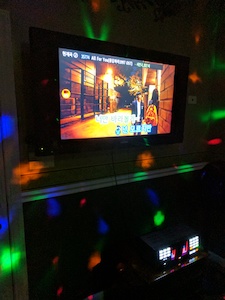노래방 - Korean Norebang (Karaoke) (and their complicated remote)

Some of the etiquette rules governing 노래방:
- Do not queue several songs at once, but let other people queue their own songs.
- Avoid looking at your phone frequently, as it is considered rude.
- If you see that you do not know a song as much as you thought, skip it (press 취소 followed by 시작 on the remote)
One of the barriers of entry to 노래방 for foreigners is probably the seemingly overly complicated remote. Learn the various features of the remote prior to going to 노래방 so that you can make the most of your time there! Check the picture (divided by zone) and the corresponding vocabulary below. You can also download this information and print it to take it with you to your next 노래방 session! If you live too far from a karaoke place, you can also buy a Korean karaoke machine for home use.
Washer & Dryer
Doing the laundry in Korea can be a daunting task, especially if not too familiar with its related words (drying, pre-wash, etc.) Similar to the 노래방 remote post, here is a breakdown of the common words written on washers and dryers (usually the same unit in Korea), and a photo example of how it looks like on a commercial machine.
South Korean LGBT Films: A Comprehensive List
Korean cinema has seen a rapid rise in LGBT-centered movies and short films in the last decade, but information in English about them is scant as best. The lists below attempt to fill this gap by classifying LGBT Korean movies produced over the year. These lists exclude dramas and movies that do not have main LGBT protagonists.
If a movie is missing from the list, please leave a comment here or on Facebook so that KoniKorean can add it to the list.
Coronavirus Korean Vocabulary and Resources
As the Coronavirus progresses in South Korea, this article lists vocabulary and resources in English and Korean to stay on top of the infection if you are currently in South Korea. This page will get updated as more information is available.
What to do. According to the CDC of Korea, for the general population (translated by KoniKorean):
- Wash your hands meticulously with soap under running water.
- When coughing or sneezing, cover your mouth and nose with your sleeve.
- Do not touch your eyes, mouth, and nose with unwashed hands.
- Wear a mask when visiting a medical institution
- Refrain from visiting places with many people
Most Popular Korean Movies in 2019
Wondering what the most popular Korean movies were in 2019? This article lists the most popular Korean movies in 2019 with links to popular streaming platforms. Leave a comment if you like any of the listed movies or disagree with the box office!
1. 극한직업 – Extreme Job
Genre: Comedy
Director: 이병헌 (Lee Byeong-heon)
Total Korean audience: 16.27M
Narcotics detectives go undercover and start a chicken restaurant to take down a gang. To the surprise of the detectives, the restaurant becomes widely popular, complicating their mission.
Korea-inspired Christmas Gift Ideas (2019)
Popular Red Velvet Songs for 노래방
List of Korean Movies in the Cannes Film Festival
The Cannes Film Festival (Festival de Cannes) is one of the most prominent film festivals in the world, with its top award (Palme d'Or) being considered as many as the holy grail of cinema. South Korean cinema has increasingly produced many cinematographic gems that have been competing for the Palme d'Or over the last two decades, with 기생충 (Parasite) by 봉준호 (Bong Joon-ho) ultimately being the first Korean movie winning the Palme d'Or of the 2019 Cannes Film Festival. Despite the growing popularity of South Korean movies, it is still challenging to find comprehensive lists about recent Korean movies that have been entered in prestigious film festivals.
Tricky Pronunciations of the Consonant ㄹ (Rieul)
In Korean, the pronunciation of ㄹ and consonants preceding or following it, such as ㄱ (기억, giyeok), ㅂ (비읍, bieup) or ㅁ, differs from the 한글 reading. Because of rules of assimilation of ㄹ to ㄴ after nasal consonants, the pronunciation of ㄱ, ㄹ, and ㅂ needs to be accounted for these changes. This post lists some of these uncommon pronunciation transformations; comprehensive pronunciation rules can be found in Korean: A Comprehensive Grammar by Jaehoon Yeon and Lucien Brown (Routledge Edition).
Pattern V/Adj-은/는 척하다: To Pretend To V/A
Verb/Adjective (V/A)-은/는 척하다 is commonly used in spoken and written Korean to express "to pretend to (V/Adj)." It can also be translated at "to make it look like (V/Adj)" in more complex sentences (see examples below).
The pattern is written differently depending on whether the word in front of the pattern is a verb or an adjective:
- For verbs, present tense: V-는 척하다 regardless of the 받침 of the verb, using common conjugation rules. E.g., 모르다 → 모르는 척하다, 놀다 → 노는 척하다, 읽다 → 읽는 척하다, 넣다→ 넣는 척하다.
- For verbs, past tense: V-ㄴ/은 척하다. E.g., 모르다 → 모른 척하다, 놀다 → 논 척하다, 읽다 → 읽은 척하다, 넣다 → 넣은 척하다. See Note 3 for a usage note.
- For adjectives: A-ㄴ/은 척하다. E.g., 똑똑하다 → 똑똑한 척하다, 이쁘다 → 이쁜 척하다.
Examples
Verbs
Adjectives
Example Dialogue
빅터: 준형아, 잘 생긴 척하지마! 너 정말 못생겼어!
